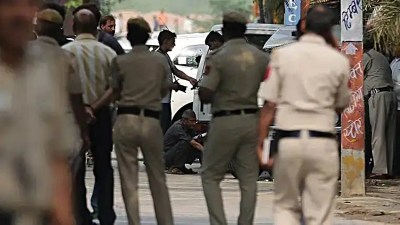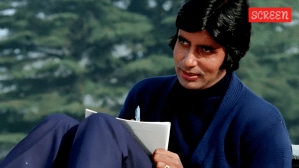These two images capture Indo vs Pak in this series
If Rahul Dravid had been born a hundred years ago, he might have been a nation-builder, a strong, educated, visionary willing to put the pur...

If Rahul Dravid had been born a hundred years ago, he might have been a nation-builder, a strong, educated, visionary willing to put the pursuit of independence beyond personal motives. Alternately he might have been a Parsi builder, creating solid, reliable structures; putting brick upon brick and not compromising on the cement. Others might have created better looking, flashier buildings but his would have resisted more storms and earthquakes.
Shoaib Akhtar, on the other hand, might have been a potentially great revolutionary, full of fire and passion, complete with the impatience of flaming youth, able to hold a mob spellbound by sheer rhetoric. He might have fallen short on vision though, might have missed the moment when it presented itself. When he walked off the field with India only a few runs ahead, a rusty Sourav Ganguly in and himself in the midst of a violent spell, he handed the match to India. Leaders lead from the front but Shoaib abdicated. His pain might have been great but the pain he inflicted on his side was infinitely greater.
It reminded me of what David Boon said on my show recently. When he suffered a cut on the chin in the West Indies, he spurned the offer to return to the pavilion, asked a doctor to come out on the ground and put eight stitches in. And he did that standing in front of the West Indies team who were having a drinks break. When I asked him why he did that he said he thought the team was doing well and he did not want to hand over the momentum to the opposition.
The way he put it, it didn’t seem he had done anything significant. Architects of great deeds make them look small. My suspicion is that if Imran Khan was captain of Pakistan, Shoaib Akhtar would either have been a different person or would have had a limited career.
If India have looked a better side than Pakistan, it is because they embraced discipline under John Wright and the support cast. Dravid is the flagbearer of that discipline and is now playing at the peak of his career. 11 of his 17 test hundreds have been scored overseas where he has 4200 runs in 45 tests, a record that must make most people stop in their tracks.
He now has five double centuries, four of them in the last 15 tests and is a greater batsman than almost all his childhood heroes. That is a deeply satisfying feeling and yet one that is sometimes difficult to come to terms with for modest people. But someone needs to say it.
He embodies the virtues of a team player and is an illustration of the power of the self. In the hands of many those are contrary values. But Dravid is willing to put the team cause first and fulfill that by using the power of the mind to overcome any doubts within. His innings at Rawalpindi was a great example of that. For the first eighty runs he wasn’t the player the world knows him to be. Cuts were hitting the bottom of the bat, occasionally the edge, the ball normally on a steep downward path was staying in the air too long, drives were finding fielders and balls seaming back were beating his bat.
Lesser men might have succumbed but Dravid is a scrapper too. He steeled himself and I am sure in his mind he was trying to forget the previous ball. It is an easy statement to make but a very difficult one to practice. For his last 190 runs he was back to being the wall showing that if you hang in there the tide will turn.
If his batting was the high point there were a couple of lows. Top order batsmen on both sides shied away from big moments; when the time came to show strength they were missing. India’s decision to open with Parthiv Patel might seem like the correct one but his defiance cannot cover up for the weakness of others. Great teams make bold decisions and this was a soft one.
India have risen to the occasion in Pakistan. It was a tour they did not want to make. It is funny how sometimes reluctance can pave the way for great deeds. At home this weekend, these players will be happy they went to Pakistan.



- 01
- 02
- 03
- 04
- 05



























